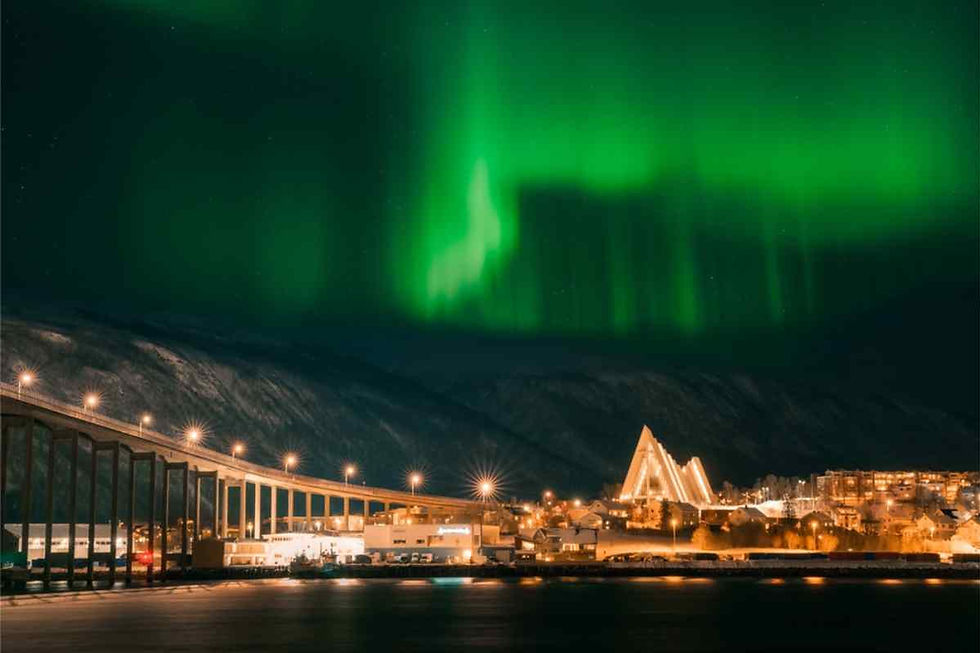Road Signs in Norway
- Jul 25, 2025
- 4 min read
As a traveler exploring the country, understanding the Norway road signs is essential to enjoy a safe, worry-free journey. The Norwegian road signs are thoughtfully designed, following European norms while incorporating unique local symbols, like moose crossings and pedestrian zones (gågate).

Let’s unpack what each category means so you can focus on the scenery instead of missing a crucial sign!
Warning signs
Warning signs in Norway are usually red triangles with white or yellow backgrounds, alerting drivers to upcoming hazards. You’ll encounter signs for:
Sharp curves, steep hills, or narrow roads, especially common on fjord roads.
Wildlife crossings: look out for moose, reindeer, sheep, or even polar bears in the far north.
Slippery surfaces or loose gravel, vital warnings during early spring or autumn.
Construction works (road narrows, men at work), often displayed with yellow backgrounds for temporary zones.

Key tip: These signs signal something unusual ahead, slow down and stay alert.
Priority signs
Priority signs, like the inverted yellow triangle (“Give Way”) or the red octagonal “Stop”, clearly indicate who should go first; crucial at intersections, tunnels, or narrow lanes.
Yellow diamond = main road.
Yellow diamond with slash = priority road ends.
Blue arrow with red slash = yield to oncoming vehicles.

On many Norwegian highways and town streets, the default rule is: you have priority unless a sign says otherwise.
Prohibitory signs
Most Norwegian stop signs and restrictions fall under this category:
Red-circled signs mean bans, no entry, no overtaking, vehicle weight/height/width limits, etc.
Blue circle with red slash specifically indicates no parking or stopping zones.

These are straightforward but incredibly important (ignore at your peril, and fines can mount quickly!).
Mandatory signs
These are circular blue signs instructing what you must do, such as:
Turn right/left, go straight, or follow roundabout rules.
Keep left/right of an obstacle, typical on islands and bridge approaches.

They ensure smooth traffic flow and safety, but are rare on scenic rural routes.
Informative signs
Informative signs come in blue or green, providing helpful guidance:
Motorway start/end, bus lanes, pedestrian crossings, tunnels, parking, and more.
Some indicate speed enforcement zones, often marked by flashing cameras.
Tourist-friendly signs in brown direct to attractions or scenic viewpoints.

These are handy to know where to stop, park, or take a quick detour and explore.
Service signs
Styled in blue, these symbols point toward essential services:
Petrol stations, EV chargers, rest stops, toilets, campgrounds, first aid, and accommodation.

Travelers in motorhomes or campervans, like we are, will find these particularly useful, especially the facilities and campsite indicators.
Direction signs
Large rectangular blue (motorways), yellow (general roads), or brown (tourist routes) signs guide you toward destinations:
Town names, road numbers, ferry terminals, airport, helipad, and even national tourist roads.
They often include arrows and distance markers.
On a motorhome road trip, these signs help you navigate long fjord stretches effortlessly.
Supplementary signs
Smaller panels beneath main signs give context:
Distances, times, vehicle types affected, or zones like “walking speed only”.
For example, “(07–17)” indicates hours of enforcement, or vehicle symbols show it applies to lorries or motorhomes.
Marker signs
These signs guide your path in tricky spots:
Chevron arrows on sharp curves, obstacle markers on narrow roads, tunnel distance markers, and reflective posts, especially useful during Norway’s dark winter months.

What this means for motorhome adventures
Traveling in a campervan or motorhome along scenic Norwegian roads? Be aware of:
Weight/height limits (prohibitory signs) before bridges and ferries.
Narrow passages, often marked by marker chevrons and meeting-place signs (møteplass).
Service signs pointing to essentials like dump stations or EV charging.
Quick Guide: Norway sign vocabulary
Sone = zone (e.g., 30 kph, parking permit).
Gågate = pedestrian street, restricted to foot traffic.
Stopp = stop (on the back of some yield signs).
Travel Tips & Take Action
Adjust speed around warning signs, sharp curves and wildlife are no joke.
Always yield or stop at stop/yield signs, even if the road seems clear.
Follow service signs: plan stops ahead, especially in rural stretches.
Look for supplementary panels: they often clarify if signs apply only during certain hours or to specific vehicles.
Ready for a stress-free motorhome journey in Norway? Consider renting one through Motorhome Norway. They offer well-equipped campers perfect for following Norwegian signs and symbols while discovering remote fjords and charming villages.
The road signs in Norway may look familiar, yet they include local quirks that you'll appreciate once you decode them. From wildlife warnings to pedestrian zones, these road signs enrich both your safety and experience. As we travel by motorhome, each sign helps bring clarity to Norway’s scenic labyrinth.
Want to dive deeper? Rent a motorhome and experience these signs firsthand, on your own Norwegian road trip, guided by friendly markers at every turn!
Safe travels, and may all your journeys in Norway be memorable and sign-posted!



